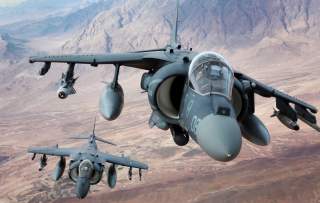These Are All the Ways the Marines are Preparing for a War with Russia or China
We have the details.
Lieutenant General Robert S. Walsh, a top US Marine Corps commander, told a US Senate subcommittee on Tuesday that his service is busy “modernizing” against a military threat from Russia and China now that Congress has authorized higher defense funding.
The Marine Corps deputy commandant for combat development and integration noted to the Senate Armed Services seapower subcommittee that the corps can now focus on developing long-range precision firing capability, technology to communicate in a degraded environment, protected mobility, air defense and information warfare.
Walsh said one project involved improving the existing High-Mobility Rocket Artillery System (HIMARS) to give it up to three times the current range, according to USNI News.
When queried by a senator about the relevance of amphibious ops in an age of long-range missiles and other defenses, Walsh reportedly said: “when we look at the new threats, new weapons, we have to look at it in different ways.”
Recommended: We Went Aboard the Most Powerful Aircraft Carrier Ever Built.
Recommended: This Is How China Would Invade Taiwan (And How to Stop It).
Recommended: The Story of the F-52 Fighter.
“We’re not going to be storming the beach like Iwo Jima,” he said, and noted a technology demonstration last year at Camp Pendleton, California, in which the initial assault waves were all unmanned vehicles.
Chinese Cyber Threat:
When asked how the Marines are dealing with a cyber threat from China, Walsh said the steps included making cyber part of their increased stress on information warfare. The general said this also includes electronic warfare, communications management and intelligence. Wash added that an “Information Group” has been created in the three Marine Air Ground Expeditionary Forces. The information warfare capability is said to have been inserted down to the company level.
The Marines are also reportedly bolstering their “organic” air defense capability “after decades of not having to worry about enemy air attacks” – in an apparent reference to declining US capability to ensure air superiority over beachheads and other conflict zones.
This first appeared in AsiaTimes here.

